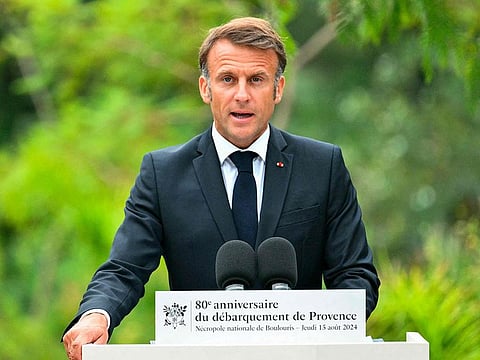Macron to meet party heads on August 23 before naming premier
France was plunged into political chaos when Macron dissolved the National Assembly

Emmanuel Macron called a meeting with party leaders on Aug. 23 to discuss the composition of a new government in a significant step toward naming a new prime minister and ending weeks of uncertainty that followed snap elections.
The president has invited the heads of the parties and parliamentary groups represented in the National Assembly for talks with the aim of building the widest and most stable possible majority in the lower house, according to a statement from the Elysee Palace.
"The appointment of the new prime minister will come following on from these consultations," the statement said.
France was plunged into political chaos when Macron dissolved the National Assembly on June 9 after his centrist alliance was demolished by the far-right National Rally in European Parliament elections. The result of the snap vote left France's most important legislative body fragmented and with no group holding enough seats to govern on its own.
Macron is constitutionally empowered to pick a new prime minister, who is typically chosen from the biggest group in parliament, but the deadlock and lack of clear winner made that task difficult. The new prime minister will likely have to rely on several parties across the ideological spectrum to form a government.
Macron said he wouldn't appoint a new premier before the end of the Paris Olympics, which concluded on Sunday, arguing that people needed a "political truce" so they could focus on the event. With the games over, pressure has increased on him to finally put an end to the uncertainty that has unnerved many French people.
Macron aides have privately suggested the new government should resemble a so-called cohabitation, in which the president and prime minister are from rival parties. This indicates he may chose someone with whom he's not too close such as a moderate politician or a technocrat with a more neutral profile.
The New Popular Front, which includes the Socialists, Greens and far-left France Unbowed, said it has earned the right to propose a premier to build a cabinet after winning the biggest number of seats in the snap election.
Macron and his allies have suggested they would rather team up with the center-right Republican Right. An informal deal between them has already helped secure the reelection of a pro-Macron lawmaker as president of the National Assembly. The French leader also aims to divide the left to encourage some moderate Socialists and Greens to join his coalition.
The new government will be closely watched by investors and neighboring countries since the prime minister controls domestic issues such as fiscal policy, while the president handles defense and foreign matters.
Sign up for the Daily Briefing
Get the latest news and updates straight to your inbox



